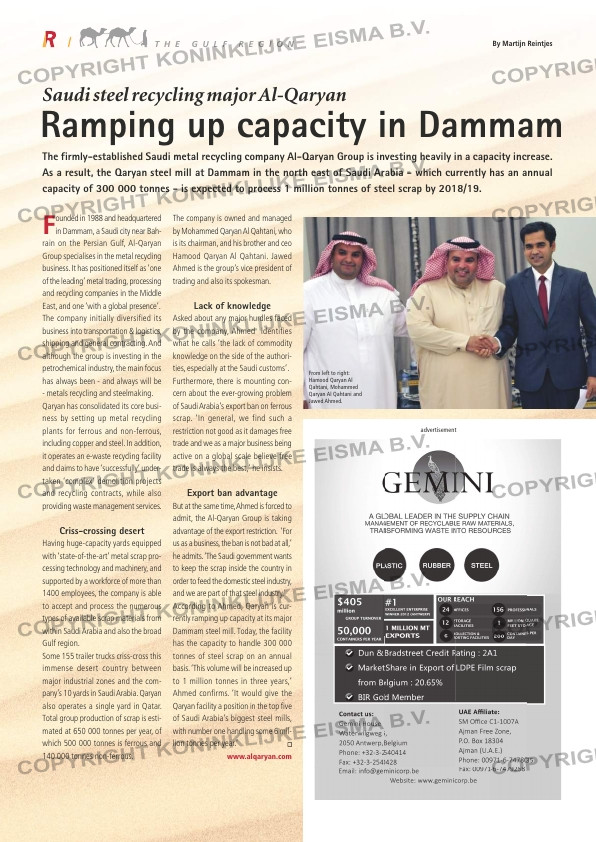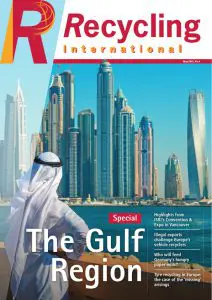Page 31 from: May 2015

31
Founded in 1988 and headquartered in Dammam, a Saudi city near Bah-
rain on the Persian Gulf, Al-Qaryan
Group specialises in the metal recycling
business. It has positioned itself as ‘one
of the leading’ metal trading, processing
and recycling companies in the Middle
East, and one ‘with a global presence’.
The company initially diversified its
business into transportation & logistics,
shipping and general contracting. And
although the group is investing in the
petrochemical industry, the main focus
has always been – and always will be
– metals recycling and steelmaking.
Qaryan has consolidated its core busi-
ness by setting up metal recycling
plants for ferrous and non-ferrous,
including copper and steel. In addition,
it operates an e-waste recycling facility
and claims to have ‘successfully’ under-
taken ‘complex’ demolition projects
and recycling contracts, while also
providing waste management services.
Criss-crossing desert
Having huge-capacity yards equipped
with ‘state-of-the-art’ metal scrap pro-
cessing technology and machinery, and
supported by a workforce of more than
1400 employees, the company is able
to accept and process the numerous
types of available scrap materials from
within Saudi Arabia and also the broad
Gulf region.
Some 155 trailer trucks criss-cross this
immense desert country between
major industrial zones and the com-
pany’s 10 yards in Saudi Arabia. Qaryan
also operates a single yard in Qatar.
Total group production of scrap is esti-
mated at 650 000 tonnes per year, of
which 500 000 tonnes is ferrous and
140 000 tonnes non-ferrous.
The company is owned and managed
by Mohammed Qaryan Al Qahtani, who
is its chairman, and his brother and ceo
Hamood Qaryan Al Qahtani. Jawed
Ahmed is the group’s vice president of
trading and also its spokesman.
Lack of knowledge
Asked about any major hurdles faced
by the company, Ahmed identifies
what he calls ‘the lack of commodity
knowledge on the side of the authori-
ties, especially at the Saudi customs’.
Furthermore, there is mounting con-
cern about the ever-growing problem
of Saudi Arabia’s export ban on ferrous
scrap. ‘In general, we find such a
restriction not good as it damages free
trade and we as a major business being
active on a global scale believe free
trade is always the best,’ he insists.
Export ban advantage
But at the same time, Ahmed is forced to
admit, the Al-Qaryan Group is taking
advantage of the export restriction. ‘For
us as a business, the ban is not bad at all,’
he admits. ‘The Saudi government wants
to keep the scrap inside the country in
order to feed the domestic steel industry,
and we are part of that steel industry.’
According to Ahmed, Qaryan is cur-
rently ramping up capacity at its major
Dammam steel mill. Today, the facility
has the capacity to handle 300 000
tonnes of steel scrap on an annual
basis. ‘This volume will be increased up
to 1 million tonnes in three years,’
Ahmed confirms. ‘It would give the
Qaryan facility a position in the top fi ve
of Saudi Arabia’s biggest steel mills,
with number one handling some 6 mil-
lion tonnes per year.’
www.alqaryan.com
T H E G U L F R E G I O N By Martijn Reintjes
Saudi steel recycling major Al-Qaryan
The firmly-established Saudi metal recycling company Al-Qaryan Group is investing heavily in a capacity increase.
As a result, the Qaryan steel mill at Dammam in the north east of Saudi Arabia – which currently has an annual
capacity of 300 000 tonnes – is expected to process 1 million tonnes of steel scrap by 2018/19.
Ramping up capacity in Dammam
From left to right:
Hamood Qaryan Al
Qahtani, Mohammed
Qaryan Al Qahtani and
Jawed Ahmed.
advertisement
RI 4-ME_Qaryan group.indd 31 30-04-15 14:38



